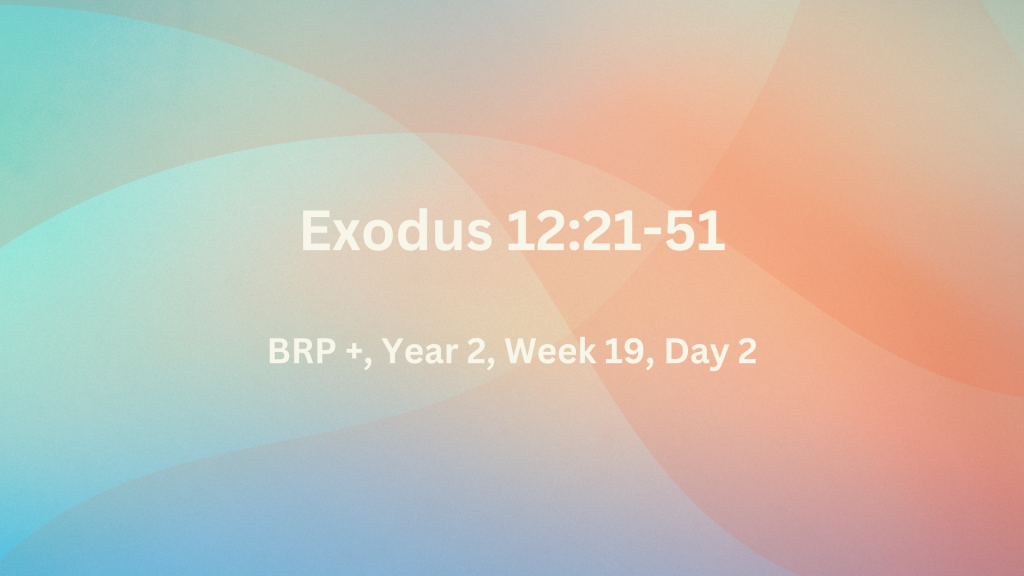Exodus 12:21-51
Q.1. What instruction did Moses give the elders of Israel regarding the Passover lamb? Why was blood to be applied to the doorposts? What restrictions were placed on the partaking of the feast? – (Exo.12:21-23, 43-49)
Moses called all of Israel’s elders. He told them to take a perfect lamb for each family, slay it, and apply its blood to the doorposts of their houses (see Exo.12:21-22). They were not to stray outdoors. The reason given was that – the Lord will pass through to smite the Egyptians; and when He sees the blood on the lintel and on the two doorposts, the Lord will pass over the door and will not allow the destroyer to come into your houses to smite you (Exo.12:23). Further instructions were given as a guide to the partaking of the Passover: (i) No foreigner, sojourner, or hired servant was to eat of it (see Exo.12:43 & 45). (ii) Purchased slaves and visitors could partake of the Passover after submitting to circumcision (see Exo.12:44 & 48 c.f. Gen.17:12). (iii) It was to be eaten within each house, and with no bone broken (see Exo.12:46; Ps.34:20; Jn.19:33 & 36). (iv) No uncircumcised person was allowed to take part in the Passover (see Exo.12:48-49). God has also given guidelines for those taking part in the Lord’s Supper (see 1 Cor.11:23-34).
Q.2. Where and how often was the Passover to be observed? What message was signified by the Passover feast? How did the people respond to Moses and his commands? – (Exo.12:24-28, 50-51)
The Passover was to be an annual event for Jewish families forever – when you enter the land which the Lord will give you, as He has promised, you shall observe this rite (Exo.12:25). The whole reason for establishing this annual observance was to provoke the question – What does this rite mean to you? (Exo.12:26). It would enable them to testify to the miracle of Israel’s birth as a nation – It is a Passover sacrifice to the Lord who passed over the houses of the sons of Israel in Egypt when He smote the Egyptians but spared our homes (Exo.12:27). The people did exactly what Moses commanded them – and on that same day the Lord brought the sons of Israel out of the land of Egypt by their hosts (Exo.12:51).
Q.3. What happened in Egypt on the night of the Passover? Why was Pharaoh’s response unusual? Did the Egyptians agree? How was Egypt plundered? – (Exo.12:29-36)
God dealt a death blow against Egypt, as – 29 … the Lord struck all the firstborn in the land of Egypt, from the firstborn of Pharaoh who sat on his throne to the firstborn of the captive who was in the dungeon, and all the firstborn of cattle. 30 Pharaoh arose in the night, he and all his servants and all the Egyptians, and there was a great cry in Egypt, for there was no home where there was not someone dead (Exo.12:29-30). Pharaoh granted Moses all his requests – the release of Israel and their flocks and herds (Exo.12:31-32). In a strange twist, Pharaoh stated – Go and bless me also (Exo.12:32). The Egyptians feared that they would all die, so urged the people to leave (see Exo.12:33). There was no time for the dough to be leavened as they packed to depart (see Exo.12:34). The Egyptians gladly gave all the articles of silver, gold, and clothing that Israel requested – Thus they plundered the Egyptians (Exo.12:36). Not a sword was raised (see Gal.3:17).
Q.4. How many Israelites were set free from Egypt? Who were the ‘mixed multitude’? With what did Israel leave? What do we learn from God’s fulfilled promise to set Israel free? – (Exo.12:37-41 c.f. Gen.15:13)
The Hebrews travelled from Rameses on the edge of Goshen, to Succoth. They numbered six hundred thousand men besides women and children (see Exo.12:37). It is generally agreed that some two million Israelites took part in the Exodus. Succoth is written into Israel’s history with the Feast of Booths – so that your generations may know that I had the sons of Israel live in booths when I brought them out from the land of Egypt, I am the Lord your God (Lev.23:43). The restrictions outlined for the Passover indicated that there were more than the Hebrews who believed in Israel’s God. This explained the record of a mixed multitude leaving with Israel (see Exo.12:38). In the end, the Exodus happened suddenly. Israel – baked the dough which they had brought out of Egypt into cakes of unleavened bread. For it had not become leavened, since they were driven out of Egypt and could not delay, nor had they prepared any provisions for themselves (Exo.12:39). They had lived in Egypt as God had promised Abraham, for some four hundred and thirty years (Exo.12:40-41 c.f. Gen.15:13-16; Acts 7:6).

